The Julen Lopetegui era at West Ham has come to an end – and a certain Englishman involved in what’s seemed like just about every managerial vacancy conversation over the last 18 months or so has finally landed his next coaching gig.
Having succumbed to a series of heavy defeats this season that left the Hammers sat 14th in the table, Lopetegui departed east London with a league record reading:
- Played: 20
- Won: 6
- Drew: 5
- Lost: 9
Unsurprisingly, the club said the Lopetegui’s time in charge “has not aligned” with their ambitions.
Reports that Graham Potter would be the man succeeding him were widespread days before the news of the Spaniard’s exit had even been announced. Now, the ex-Brighton and Chelsea boss has indeed signed a two-and-a-half year contract.
Duly, we’ve put together this Scout Report to take a look at the ins and outs of Potter’s managerial past. We also look what his appointment could mean for West Ham, their players, and Fantasy Premier League (FPL) managers.
THE HISTORY
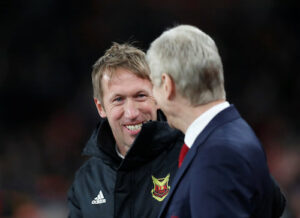
After wrapping up his own playing career, and earning two university degrees while starting out coaching, Potter’s first managerial post came at Northern Counties East League Division One club Leeds Carnegie. However, it was his stint with Swedish side Östersund that first began catching eyes from around the footballing world.
He joined in 2011 with the club in Sweden’s fourth tier. By 2013, Östersund had achieved successive promotions. Two years later, Potter had guided his side to a first-ever promotion into the country’s top flight, where they finished eighth in their debut season. In 2017/18, the up-and-coming English manager led his troops on a historic run into the Europa League last 32, where they beat Arsenal 2-1 at the Emirates but eventually lost the two-legged tie on aggregate.
“Quite often there’s no perfect situation that emerges. My situation, and my opportunity, was the fourth tier in Swedish football and a place that nobody really wanted to go to.
“Of course, it’s turned out well for me. Sometimes it does, sometimes it doesn’t. It was a fantastic opportunity and a fantastic life experience. I didn’t feel like the typical pathway was enough for me. That’s the beauty of football. You never know where things are going to end up.” – Graham Potter on his decision to join the Swedish team
At the end of that domestic season, in which Östersund finished fifth, Potter joined freshly relegated Swansea City in the Championship on a three-year deal. He steered the Welsh club to the quarter-finals of the FA Cup, where they were beaten by Manchester City.
After less than a year in charge of the Swans, Brighton came calling with a big-money offer and Potter and his backroom staff were headed for the Premier League.
The Seagulls finished 15th in Potter’s first season at the helm, their joint-highest placing in the top flight, while recording what was then their highest points and goals totals. Another record-breaking season followed, as Brighton equalled their points tally, scored 40 goals and kept 12 clean sheets, despite slipping to 16th place in that 2020/21 campaign.
Things really clicked in his third season (2021/22) on the south coast, which ended in new record points (51) and goals (42) tallies. It was, at the time, the club’s highest top-flight finish (ninth).
After another bright start in 2022/23 that saw Brighton sitting fourth in the league, Chelsea came calling -and that was that.
That was (for now, at least) to be the end of the upward trajectory, though.
While his tenure at Chelsea (beginning in September 2022) began somewhat promisingly, a 4-1 away defeat at Brighton proved to be a sign of troubles to come. Potter was forced to contend with an overflowing squad following the spending spree embarked upon by the club’s new owners.
The Blues were dumped out of the FA Cup in the third round by early January 2023 and the wider calls among fans for his head began a month later following defeat by Southampton, who were rooted to the bottom of the table.
Potter led Chelsea into the Champions League quarter-finals a month after that but by early April 2023 – just seven months after taking charge, and before he could even contest that next European knock-out stage – he had been sacked.
Chelsea were sat 11th in the table at the time, with Potter’s record as their boss reading:
- Played: 31
- Won: 12
- Drawn: 8
- Lost: 11
As mentioned, the Englishman has since been linked with numerous clubs and even national teams but has repeatedly made clear that he had no problems taking an extended break until “the right thing” came along.
Now, it would appear he thinks it has.
“It’s a big tradition, big history, big expectation. A big challenge. It’s a bit like Christmas for the adults.” – Graham Potter at his West Ham unveiling on Thursday.
MANAGEMENT STYLE
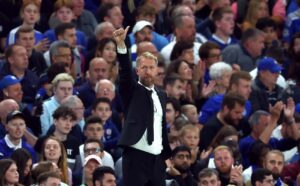
Those aforementioned university degrees Potter earned were in social sciences as well as leadership, personal and professional development and emotional intelligence – undertakings which have no doubt shaped his approach to management.
Speaking after his appointment as Chelsea boss in 2022, he said of his man-management style:
“I value people and I value relationships and I am as authentic as I can be. My job is to understand the person first and foremost, and to help them improve.
“If we can create an environment where people genuinely think that we are trying to help them, trying to improve them and make them better, then maybe they will try a bit harder and do a bit better for the team and the club.
“I have to remind myself of that a lot, especially if we’ve got beat. It takes me probably 24-48 hours to come out of that darkness of defeat.”
And at his unveiling on Thursday, he sought to assure Hammers fans that things would be different following their relatively dismal start to the campaign.
“There’s expectation, there’s demands, a recent history of success. My experience is if you can build a team that is recognisable on the pitch, that supporters proudly identify with and enjoy watching; if you get that connection between the players and supporters, everybody aligned.
“If that’s there, with that trust and connection, why put a ceiling on anything? Let’s go with the journey, be excited and go with a smile.”
Potter has also championed player development, playing a key role in bringing through and improving the likes of Alexis Mac Allister (£6.2m), Leandro Trossard (£6.8m) Yves Bissouma (£4.9m), Marc Cucurella (£5.2m), Ben White (£6.1m), Moisés Caicedo (£4.9m) – all of whom have gone on to earn big money moves to their current clubs.
PLAYING STYLE
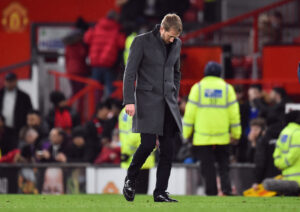
Much of Potter’s plaudits have been earned thanks to his exciting and free-flowing brand of football, which has tended to blend tactical flexibility with possession-based attacks.
Pep Guardiola, for example, had this to say about his counterpart’s Brighton side, who beat Man City (once) 3-2 towards the end of the 2021/22 season:
“We were in front of the best English manager right now. As a spectator, I like to watch these teams. I like watching Brighton play. I recognise it. When I was a football player, I would love to play in this team.”
Through the beginning of Potter’s coaching career, at Östersund and Swansea, he tended towards a versatile 4-2-2 at first, which eventually morphed into more of a 4-2-3-1 by the time he’d arrived in Wales.
Of his footballing beliefs, Potter said in 2022:
“I want a tactically flexible, attacking, possession-based team. Players that are brave, that aren’t afraid to make mistakes. That can get on the ball and show courage and really try to enjoy their football.
“If the players are enjoying their football, there’s a chance that the supporters will enjoy it as well. That’s how you grow and develop as a club. Styles of play don’t make you win games. The challenge is having players believe in it and how it works.”
Those two formations were also used at Brighton, though Potter eventually began to prefer varying back three shapes in his time at the Amex.
A 3-4-2-1 was the most common of these, and – look away, FPL managers! – rotation was relatively rife as Potter tweaked and tinkered his line-ups and shapes based on the team’s opposition.
His ability to do so was of course helped by the Seagulls having a strong, well-recruited and well-developed squad, with a host of players – Trossard, Pascal Gross, Solly March and Mac Allister, for example – capable of playing several positions.
He also tended to ask more of forward players like Neal Maupay, Trossard and Danny Welbeck (£5.5m), with the expectation that they could drift wide and even drop deeper to get involved as needed, helping the side keep their shape in attack even when wingers or attacking midfielders bomb forward and inward.
“I think football’s about balance. It’s not always one thing or another thing, it’s not always about high pressing, sometimes you’ve got to defend your box really well, so it’s a constant process.” – Potter breaking down his approach at Brighton in an appearance on Sky Sports last September.
At Chelsea it was a similar story, with Potter commonly flitting between 4-2-3-1-style back fours and 3-4-3 or 3-4-2-1 back threes – but simply with less success, likely at least in part due to having little time afforded to gel together his burgeoning squad.
A fluid 4-2-3-1 (meets 5-4-1 and 3-4-3!) is indeed what we saw on Friday night in Potter’s first match in charge at Villa Park.
THE FPL PROSPECTS
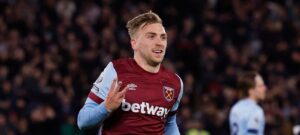
One of Potter’s first tasks at the London Stadium will be figuring out how to get his new team ticking again in the injury-enforced absence of captain and talisman Jarrod Bowen (£7.4m). He isn’t expected back until early February after fracturing his foot late last month.
Even with Bowen in the side, the Hammers have struggled goals-wise. Outside the relegation spots, only three teams – Manchester United, Crystal Palace and Everton – have scored fewer. It’s a similar story at the other end, where their leaky backline’s 39 goals conceded is the fourth-most in the league.
Former first-choice striker Michail Antonio (£5.3m) faces a lengthy period on the sidelines and injury woes are also being felt elsewhere on the pitch at the moment, including in defence with Jean-Clair Todibo (£4.2m) and Emerson (£4.4m).
More misery was to follow on Friday:
Potter on Fullkrug and Summerville: “I would imagine it’s quite a severe hamstring injury (for Fullkrug) when you pull up like that so that’s a concern for us. He (Summerville) pulled up a little bit. We didn’t think it was worth the risk for him to carry on.” #WHUFC
— Roshane Thomas (@RoshaneSport) January 10, 2025
DEFENCE
Under Lopetegui, West Ham almost always lined up with four at the back – some combination of Emerson or Aaron Wan-Bissaka (£4.6m) on the left, two of Max Kilman (£4.4m), Todibo and Konstantinos Mavropanos (£4.3m) as the centre-backs, and Wan-Bissaka or Vladimír Coufal (£4.2m) on the right. However, as mentioned Potter has pivoted in his more recent managerial roles into regularly incorporating flexible back threes into his plans as well.
Reports have already emerged that the new boss is keen on reuniting with Chelsea outcast Ben Chilwell (£4.7m), a move which could see Wan-Bissaka shifted back over to his natural right-sided position. Coufal, Wan-Bissaka’s chief competition there, is out of contract in the summer, so could be on his way out anyway, while the possible arrival of Chilwell would pit him against ex-Blues left-back Emerson when the latter is fit.
At Chelsea in 2022/23, Chilwell missed nearly three months of Potter’s brief reign with a hamstring injury. But when he was available, the England international made 10 starts, kept three clean sheets and registered a goal and an assist – respectable numbers in a team in relative turmoil – as well as ranking among the best defenders in the division for goal attempts. He’s still just 28 years old, too, meaning time away from Stamford Bridge where he has already been frozen out could give a new lease of life to a player who was a fine fantasy pick in his prime.
Whether in a back three or four, it’s likely that Todibo and the ever-present Kilman feature in Potter’s starting defence, with Mavropanos the back-up ready to step in when needed.
Of course, particularly in trickier matches when West Ham may be on the back foot, that trio of natural centre-backs could form the back three while Emerson/Chilwell and Wan Bissaka/Coufal/Summerville act as wing-backs.
Behind that crew, time will tell which of Alphonse Areola (£4.2m) or Łukasz Fabiański (£4.1m) prefers between the sticks. The former is perhaps more comfortable with the ball at his feet while the latter is arguably a better shot-stopper. Fabianski was given the nod on Friday with Areola absent – we await to hear the reasoning, if any, behind that.
MIDFIELD
Further forward, the strength of the opposition may dictate Potter’s choices at the base of West Ham’s midfield, where two of his troops are likely to be stationed (when out of possession, at least). The attack-minded Tomáš Souček (£4.9m) started the majority of matches under Lopetegui when available, with Edson Álvarez (£5.0m) and Guido Rodríguez (£4.8m) largely sharing minutes so far this season as more natural holding midfielders. That’s meant Carlos Soler (£5.0m) has more often than not been restricted to cameos from the bench under Lopetegui.
Under Potter, however, the Spaniard could prove a better option to help facilitate a more creative and possession-based style of play. This may not happen immediately – it was Alvarez who was preferred alongside Soucek at Villa Park.
One major personnel change that could come from this managerial swap is the more regular inclusion of Crysencio Summerville (£5.6m). The young Dutchman excelled at Leeds last season but has been restricted to just seven starts since his summer move, only completing 90 minutes for the first time in Gameweek 20.
Trusting in the pacey Summerville could not only give the Hammers more attacking threat but also frees up Mohammed Kudus (£6.2m) to shift over to the middle where he desires to play. Kudus has frequently been his side’s biggest threat going forward.
We saw Summerville on the right on Friday evening (operating as a hybrid right winger/wing-back), with Lucas Paquetá (£5.7m) on the opposite flank. The two combined for the Hammers’ opener.
It remains to be seen where Bowen plays, when he returns.
ATTACK
Up top, with Antonio injured and Danny Ings (£5.0m) ageing and out of favour, Niclas Füllkrug (£6.7m) is currently the only out-and-out striker Potter has at his disposal. Or should we say ‘had’, after Friday’s hamstring injury.
There have been rumours of Potter looking to bring someone like Evan Ferguson (£5.5m) – another of his former charges, who is currently injured but also struggling for gametime at Brighton under Fabian Hurzeler – to the London Stadium. Such a move may be accelerated with Füllkrug a concern.
If his squad isn’t boosted by a new attacking arrival this month, there’s a chance we could see someone like Kudus, Bowen or even Summerville stationed up front as something of a false nine going forward, as the likes of Trossard were at times for Brighton.
FIXTURE OUTLOOK

West Ham are low down the ticker over the next six Gameweeks, so perhaps we can watch and wait for the time being.
Gameweek 27 might be a better time to pounce, should there be signs of improvement under Potter:

Potter being priced up at just £0.5m also makes him worthy of consideration for the new Assistant Manager chip during this run.
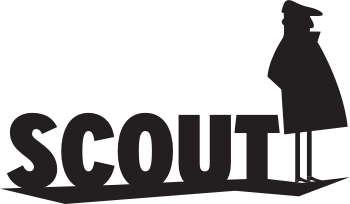




11 hours, 41 mins agoFPL Fatman Scoop back on the books!